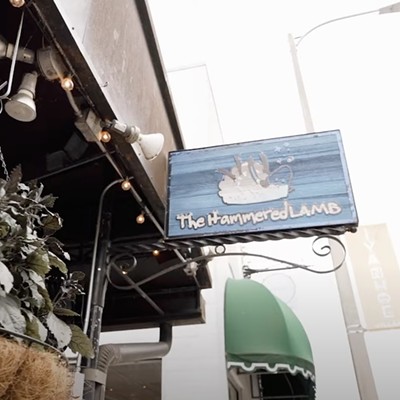The first thing you'll notice is how it jumps out of the speakers. "1969" has always been a worthy anthem, a manifesto to nothingness that, over 35 years later, sounds as fresh as the day it was recorded. Punk rock and its ilk may have had an ephemeral ambition, a live-fast, die-young credo in its defiant heart, but what young kid figures there's life after 30 anyhow? This music, which received critical kudos if never the mass audience it deserved, is now being ambitiously reissued by the publicly traded Warner Music Group through its Rhino reissue arm. That fact points out aspects of free market happenstance and cultural irony that are no doubt lost on the people paid to make sense of music on a spreadsheet. Just as you can't legislate morality, you can't predict what music will resonate decades later.
     Sure, to hear it told today, The Stooges, starring Iggy Pop, were an unquestionably important band from Detroit. The Ramones were trailblazers with their leather jackets and stripped-down buzz-bomb chords. And Richard Hell was the man who had an important hand in the work of New York City greats from the Heartbreakers to Television to the Voidoids to the Dim Stars. With the exception of the Dim Stars – the NYC collective that included Hell, Sonic Youth's Thurston Moore and Steve Shelley and scenester Don Fleming – this is now all true.
     But find me someone who truly believed that three decades after it all went down, reissue experts would be combing the vaults and commissioning comic artists to better present these punk "legends," and I'll find you someone who was out of a job back in the day. When Clinton Heylin first published his talking history of underground rock From the Velvets to the Voidoids in 1993, it was seen as an opportunity to educate the mainstream end of the Nirvana-come-lately crowd, while providing insightful reading to the music's loyalists. Twelve years later, in an updated paperback version, it's still a necessary primer.
     For Bill Inglot, the reissue supervisor on many of Rhino's projects, what gets released often dictates itself. "A lot of it isn't brain surgery," he explains. "You just roll tape and listen. Sometimes you find stunning stuff and, frankly, sometimes there isn't anything. Some bands have no outtakes."
     But when you're presented with a 12x12 cube of master tapes marked "Stooges – Fun House," and you realize these are mostly legit performances, that's how a seven-CD box set happens (1970: The Complete Funhouse Sessions, released in a limited edition of 3000 copies five years ago). That set has now been boiled down to a one-disc taster as the second disc of this year's Funhouse two-disc reissue, while the original John Cale mixes of the first Stooges album, along with extended run-ons of several album tracks ("No Fun," "Little Doll"), provide the bonus material for the second disc of the band's eponymous debut.
     It's something that we as fans have come to expect in this too-much-information age. But it's something that's very likely to change in our lifetime with the advent of digital technology. "Modern-day recording takes are now recorded to hard drives, and records are now constant works in progress, as opposed to banging something out and trying it again," says Inglot. "Now it's overwriting. It's like this: Take those photos you hated when you pulled them out of the packet from the drugstore 20 years ago. Now you appreciate them. And now if people see that photo, they hit delete and it's gone forever. It's going to fundamentally change people's impressions of the past."
     For the Ramones – who have already been anthologized three times and who have seen their outtakes issued as bonus tracks with their remastered original albums – it was time to do a comprehensive three CD-one DVD "greatest hits" box, resulting in Weird Tales of the Ramones.
     "Johnny `Ramone` felt the two-disc anthology `1999's Hey! Ho! Let's Go!` had not really told the story the way he wanted it told," says the new box set's co-producer (and Rhino publicist) Jeff White.
     While no one actually needs most of the tracks culled from their last half-dozen albums, fans have been given desirable bonus material. The fourth disc is a DVD collecting all of the band's promotional videos, the first 12 bound together as Lifestyles of the Ramones with interview footage laced throughout. But what really stands out here is the booklet, a full-color comic book featuring artists who either worked alongside (John Holmstrom) or were influenced by (Mary Fleener) the group. "Packaging has always been a big concern for us, as record geeks," explains White. "It's something people can treasure as an artifact, as something to sit down with and look at."
     For Richard Hell, it was about the sound. Voidoid guitarist Ivan Julian helped mix and master Spurts and is blunt about his task.
     "It was a challenge," he says. "The Heartbreakers thing `"Chinese Rocks"` was recorded on a broken bottle. I heard it and was like 'What the fuck do you want me to do with this? It's all static.' I almost withdrew from the project right there."
     But Hell took the time to get the Voidoids' and Dim Stars' master tapes back. Julian was given a chance to correct the frequency imbalances on the Dim Stars recordings, and carefully tinkered with the Voidoid classics. "We took some compression out of the master, but we didn't want to monkey with it too much, just add a little sparkle," he says.
     Pressed for why this music succeeds where modern bands who emulate it often fail, Julian offers, "It's that much more derivative `these days`. It seems homogenized. It doesn't make me go 'What?' That's always what I look for in music. It lacks a sexuality. It's so contained-sounding, it can't get hard, excuse the pun."
     Ironically, the initial punk music the media presented as fashion-conscious was always aiming for permanence. "We were always trying to make music that would stand the test of time and not be trendy," says Julian. "Even though Blank Generation is a punk record, we think of it as a rock & roll record."


















